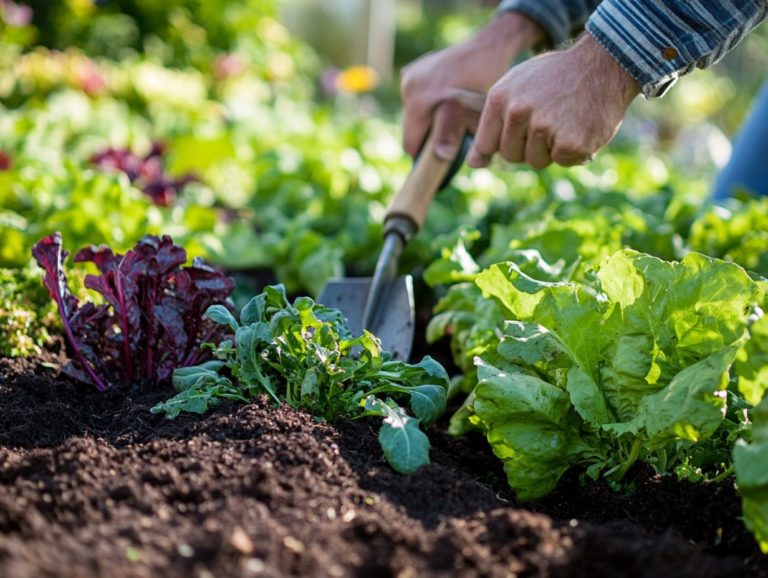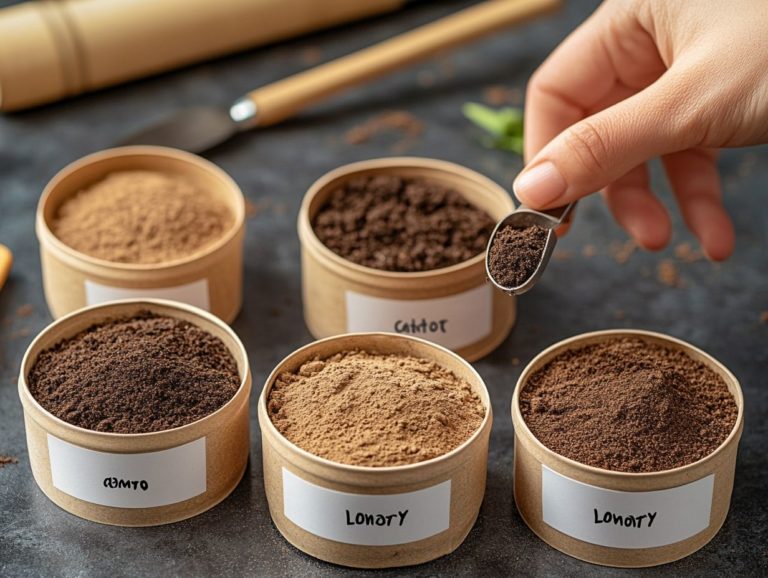5 Essential Soil Amendments for Cold Climates
In colder climates, nurturing your soil is essential for ensuring robust plant growth. Grasping the right soil amendments materials added to improve soil quality can truly elevate your gardening game, particularly as temperatures begin to dip.
This article delves into five vital amendments: compost, peat moss, vermicompost, bone meal, and fish emulsion. You ll discover what soil amendments are, why they matter in chilly conditions, how frequently to apply them, and tips for selecting the ideal options for your garden.
Get ready to transform your soil into a thriving garden right now!
Contents
- Key Takeaways:
- 1. Compost
- 2. Peat Moss
- 3. Vermicompost
- 4. Bone Meal
- 5. Fish Emulsion
- What Are Soil Amendments and How Do They Work?
- How Often Should Soil Amendments Be Applied?
- What Are the Different Types of Soil Amendments?
- How Can You Determine Which Soil Amendments to Use?
- What Are the Pros and Cons of Using Soil Amendments in Cold Climates?
- Frequently Asked Questions
- What are the top 5 essential soil amendments for cold climates?
- Why is compost important for soil in cold climates?
- Can I use peat moss as a soil amendment in cold climates?
- What benefits does manure provide in cold climates?
- Why is bone meal recommended for soil in cold climates?
- Is vermiculite useful for soil in cold climates?
Key Takeaways:
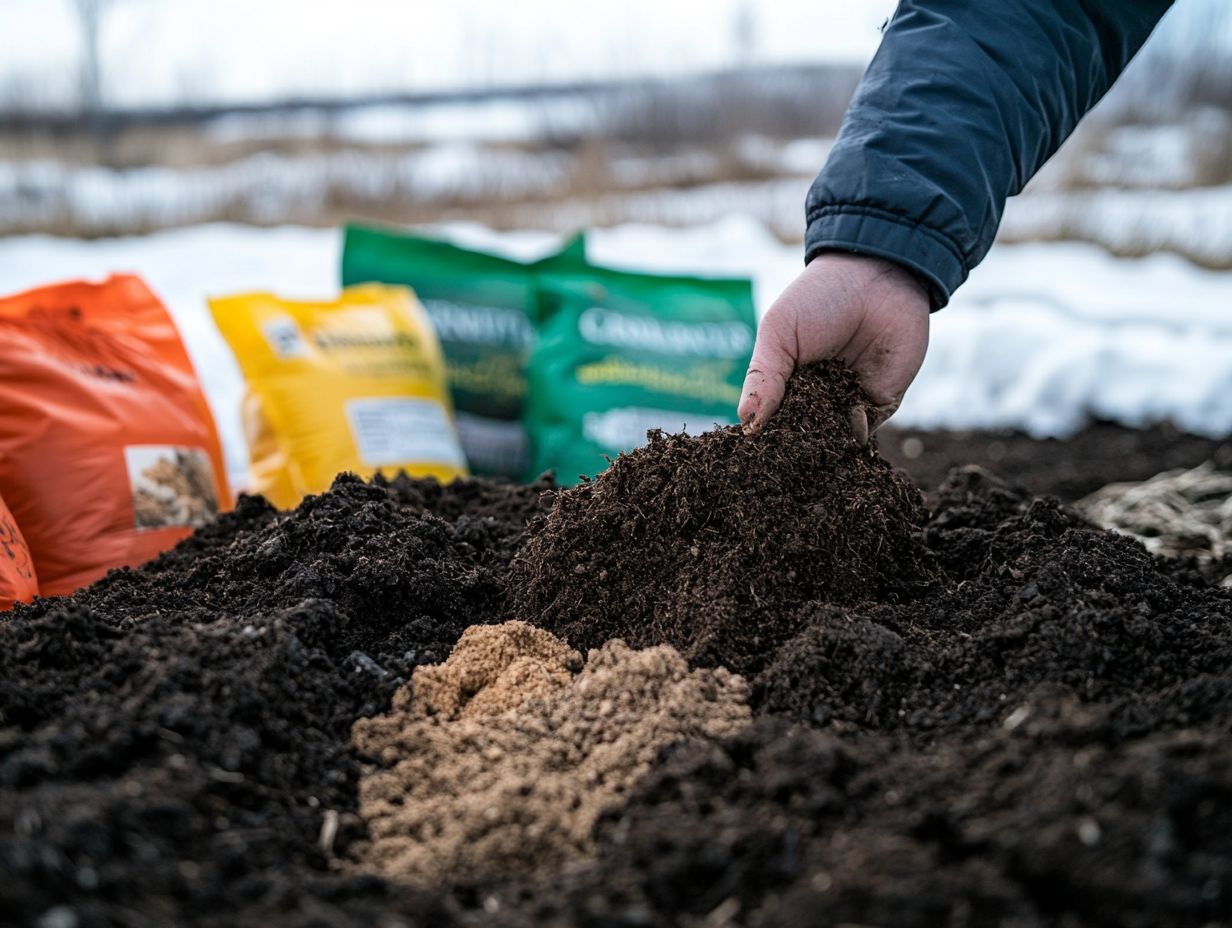
- Compost is a versatile and affordable soil amendment that improves soil structure and fertility, making it a must-have for any garden in a cold climate.
- Peat moss is a great option for improving moisture retention and acidic soil pH in cold climates, but be mindful of its sustainability and environmental impact.
- Vermicompost, or worm compost, is a nutrient-rich and organic amendment that can help boost plant growth and improve soil structure in cold climates.
1. Compost
Compost is an essential organic amendment that transforms your soil health by enhancing tiny organisms, elevating nutrient levels, and improving the overall structure of your garden beds.
By integrating compost into your gardening practices, you cultivate a thriving ecosystem that supports plant growth while encouraging the biological activity necessary for a sustainable and productive garden environment.
This nutrient-rich material enhances soil aeration, allowing roots to delve deeper and access water more efficiently.
Making compost is easy! Just collect kitchen scraps like vegetable peels, combine them with yard waste such as leaves and grass clippings, and layer them in a compost bin.
This process not only diverts organic material from landfills thereby reducing greenhouse gas emissions but also nurtures a self-sustaining gardening practice.
With consistent applications of compost, your garden can thrive with increased resilience against pests and diseases, ultimately leading to a more sustainable and eco-friendly gardening approach.
2. Peat Moss
Peat moss is an organic powerhouse that remarkably improves soil structure and moisture retention, making it your go-to solution for enhancing both sandy and clay soils.
Beyond its impressive moisture-retaining abilities, peat moss serves as a natural conditioner, playing a vital role in soil amendments.
This versatile material not only enhances drainage allowing excess water to flow away and preventing root rot but also promotes aeration, ensuring that vital air reaches the root zones of your plants effectively.
As it mingles with other amendments like compost or fertilizers, peat moss helps create a balanced environment that encourages robust plant growth.
Its exceptional capacity to retain nutrients boosts soil fertility, making it an essential ally for anyone aiming to cultivate vibrant, thriving landscapes.
3. Vermicompost
Vermicompost, crafted through the diligent work of earthworms, serves as a nutrient-rich organic fertilizer that significantly enriches soil microbial life and promotes robust plant growth.
The journey to creating vermicompost begins with feeding earthworms organic waste materials think kitchen scraps, leaves, and even paper.
These industrious creatures break down these materials into a rich, dark humus-like substance. This transformation does more than simply add nutrients; it enriches the soil with essential elements like nitrogen, phosphorus, and potassium while also improving its structure and moisture retention.
When you incorporate vermicompost alongside other soil amendments, such as traditional compost and mulch, you create a powerful synergy.
This dynamic combination boosts nutrient availability, nurtures beneficial microbial communities, and reduces the risk of soil erosion. The result? Healthier plants and a bountiful harvest that you can proudly enjoy.
4. Bone Meal
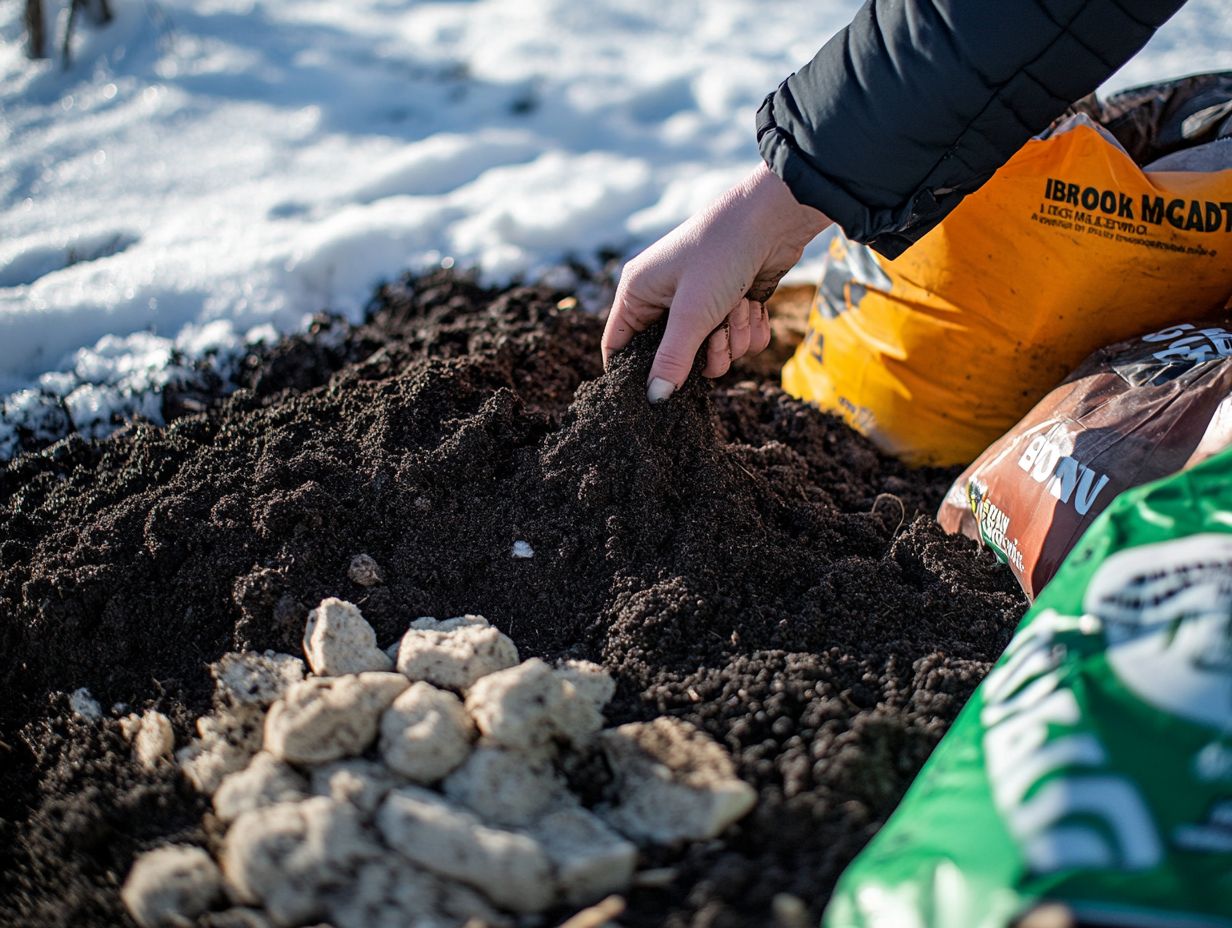
Bone meal is an organic fertilizer packed with phosphorus and calcium. These are crucial for helping roots grow strong and promoting overall plant growth in your garden.
This natural supplement significantly enhances soil health. It s especially great for anyone looking to cultivate vibrant flowering plants and nutrient-rich vegetables.
By enriching your soil with these vital minerals, bone meal increases nutrient availability. You ll notice that bone meal makes your plants stronger and healthier!
Applying it during the planting phase lays a solid foundation for growth. This ensures your plants have the necessary building blocks to truly thrive.
5. Fish Emulsion
Fish emulsion is a fantastic organic fertilizer filled with nitrogen. It s an excellent choice for boosting nutrient levels in your garden and nurturing robust plant growth.
This natural product comes from the byproducts of fish processing. It nourishes your plants effectively while promoting environmentally sustainable practices.
Its nutrient profile is rich with essential big nutrients and small nutrients, including phosphorus and potassium, both vital for plant vitality.
For optimal results, apply fish emulsion during the active growing season. You can use it as a foliar spray or dilute it in your watering can. This ensures thorough coverage of both soil and foliage.
Regular applications can lead to lush foliage, vibrant blooms, and an overall boost in plant vigor.
What Are Soil Amendments and How Do They Work?
Soil amendments are your secret weapon for transforming your garden. By adding these substances, you enhance the soil s properties. This boosts nutrient content, improves structure, and nurtures microbial life.
Think of common amendments like compost, bone meal, and vermicompost as the VIP guests your soil desperately needs. They deliver essential nutrients like nitrogen and phosphorus, while increasing organic matter for moisture retention and drainage. For those gardening in colder climates, understanding how to amend clay soil can make a significant difference in your garden’s success.
When you understand how these amendments work, you can cultivate a fertile environment that supports robust plants and minimizes your environmental footprint.
Different soils have their quirks. Sandy soils often struggle with nutrients, while clay soils can be too soggy. For instance, sand is great for drainage but tends to lose nutrients. Here, compost shines by enriching sandy soils with the organic matter they crave.
If you re dealing with heavy clay, amendments like gypsum can work wonders. They break up compacted layers and enhance drainage.
To make the most of these interventions, conduct soil testing. It reveals specific nutrient deficiencies and pH levels, helping you choose the right amendments for optimal results.
Why Are Soil Amendments Important in Cold Climates?
In cold climates, soil amendments are essential for enhancing nutrient retention and improving soil structure. These are two key factors that support plant growth during short growing seasons and help prevent erosion caused by freeze-thaw cycles.
You’ll often face unique challenges in these regions. For instance, drastic temperature drops can impede seed germination, and shorter frost dates limit your productive window for crops. To tackle these issues, consider how to build healthy soil in cold climates by adding organic matter like compost or well-rotted manure.
These additions enrich your soil with vital nutrients and can help you follow the 5 essential soil preparation steps for cold climates, insulating plant roots from biting cold temperatures.
Using materials like peat moss or wood chips can further enhance soil aeration and moisture retention. This ensures that your plants thrive even in the most unforgiving conditions.
Start using these tips today for a healthier garden! Don t wait to enrich your soil!
How Often Should Soil Amendments Be Applied?
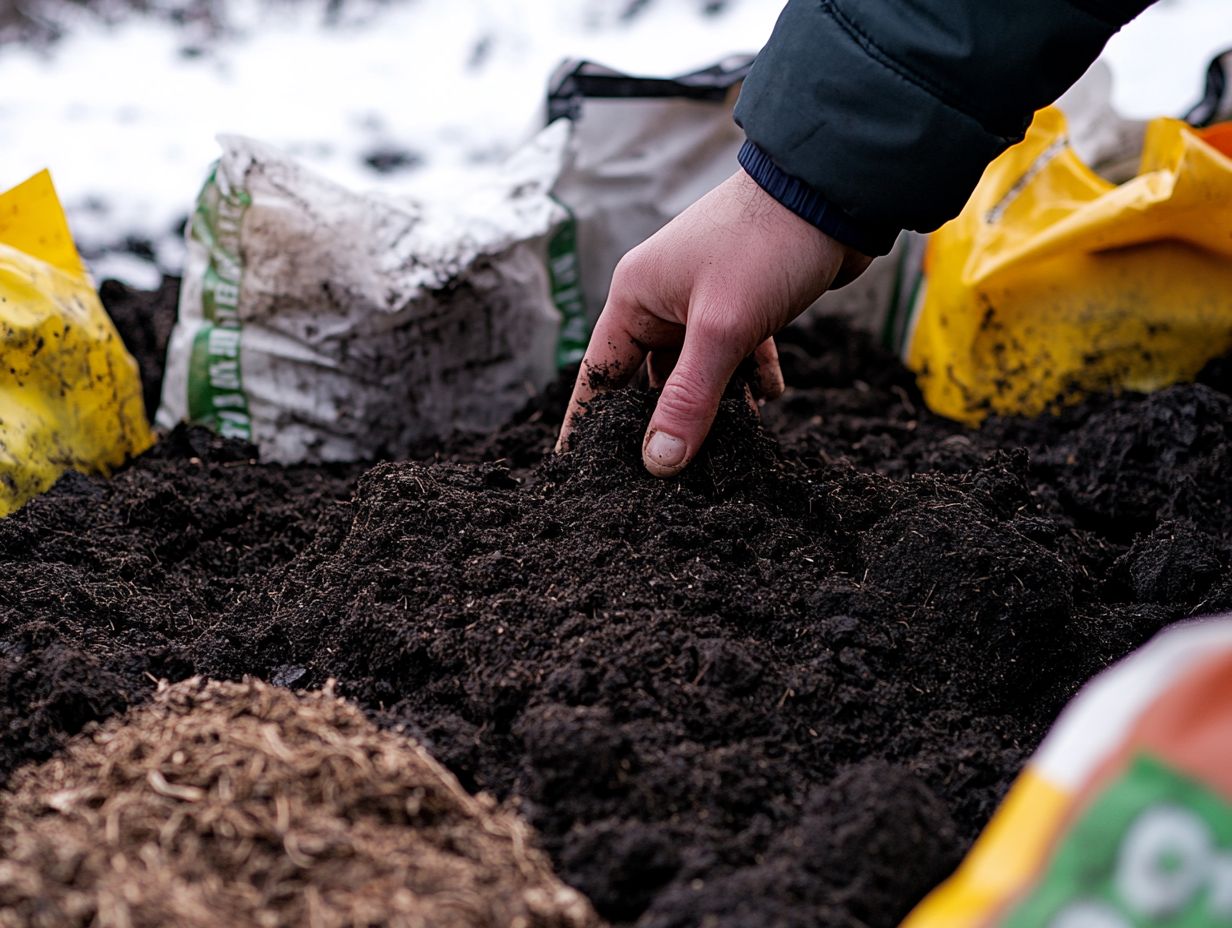
The frequency of applying soil amendments depends on the unique needs of your soil and the specific plants you are cultivating. Regular soil testing and careful observation of plant health can help clarify these needs.
It s essential to consider factors like soil type. For example, sandy soils may require more frequent adjustments because they drain quickly and leach nutrients. In contrast, clay soils, which hold nutrients better, might need less frequent interventions.
Crop rotation is a key factor as well. Different plants have distinct nutrient requirements, and understanding these can guide you on when and how much amendment to apply.
Seasonal variations also matter. Amendments can be particularly beneficial at the start of the planting season when plants are establishing their roots.
By considering these factors, you can make informed decisions about the timing and frequency of your amendments, ensuring a healthier and more productive yield.
What Are the Different Types of Soil Amendments?
You ll encounter a variety of soil amendments, ranging from organic options like compost, vermicompost, and bone meal to chemical fertilizers. Each type plays a unique role in enhancing soil health and biological activity.
Organic amendments enrich your soil by improving its structure and boosting moisture retention, creating a vibrant ecosystem for beneficial microbes. For instance, compost not only provides essential nutrients but also enhances aeration and aids in water absorption.
Conversely, inorganic fertilizers are high in specific nutrients like nitrogen, phosphorus, and potassium. They deliver a quick boost to plant growth. However, overusing these chemicals can cause nutrients to wash away from the soil into nearby water.
Finding the right balance and proper application of these amendments is crucial for cultivating a healthy and productive garden or farm.
How Can You Determine Which Soil Amendments to Use?
Determining which soil amendments to use involves a careful soil testing process to understand your nutrient levels, soil pH (which measures how acidic or alkaline your soil is), and organic content. This ensures the amendments you select align perfectly with your garden s unique needs.
This process starts with collecting soil samples from various areas of your garden. Different sections may exhibit distinct conditions. After gathering the samples, send them to a lab for analysis. The results will reveal any deficiencies or excesses in essential nutrients.
Understanding these results is vital. For example, a low pH may indicate acidic soil that could benefit from lime, while high nitrogen levels might require a nitrogen-reducing amendment. By tailoring your amendments to the specific requirements of your plants, you can not only boost their growth but also maximize the overall health and vitality of your garden.
What Are the Pros and Cons of Using Soil Amendments in Cold Climates?
Using soil amendments in cold climates has its advantages and disadvantages. While they can enhance nutrient retention and improve soil structure, top 10 soil amendments for cold-weather gardens highlight the importance of careful management to avoid issues like nutrient leaching during temperature fluctuations.
The costs associated with these enhancements can vary widely, presenting a financial challenge for farmers or gardeners striving to improve soil health. It’s also vital to consider the potential environmental impact, as improper application can lead to runoff that affects nearby water bodies.
However, when applied thoughtfully, the right amendments can bolster plant resilience during harsh winters, making them a valuable asset for legume crops. Mastering the balance of benefits and drawbacks is vital for thriving plants!
Frequently Asked Questions
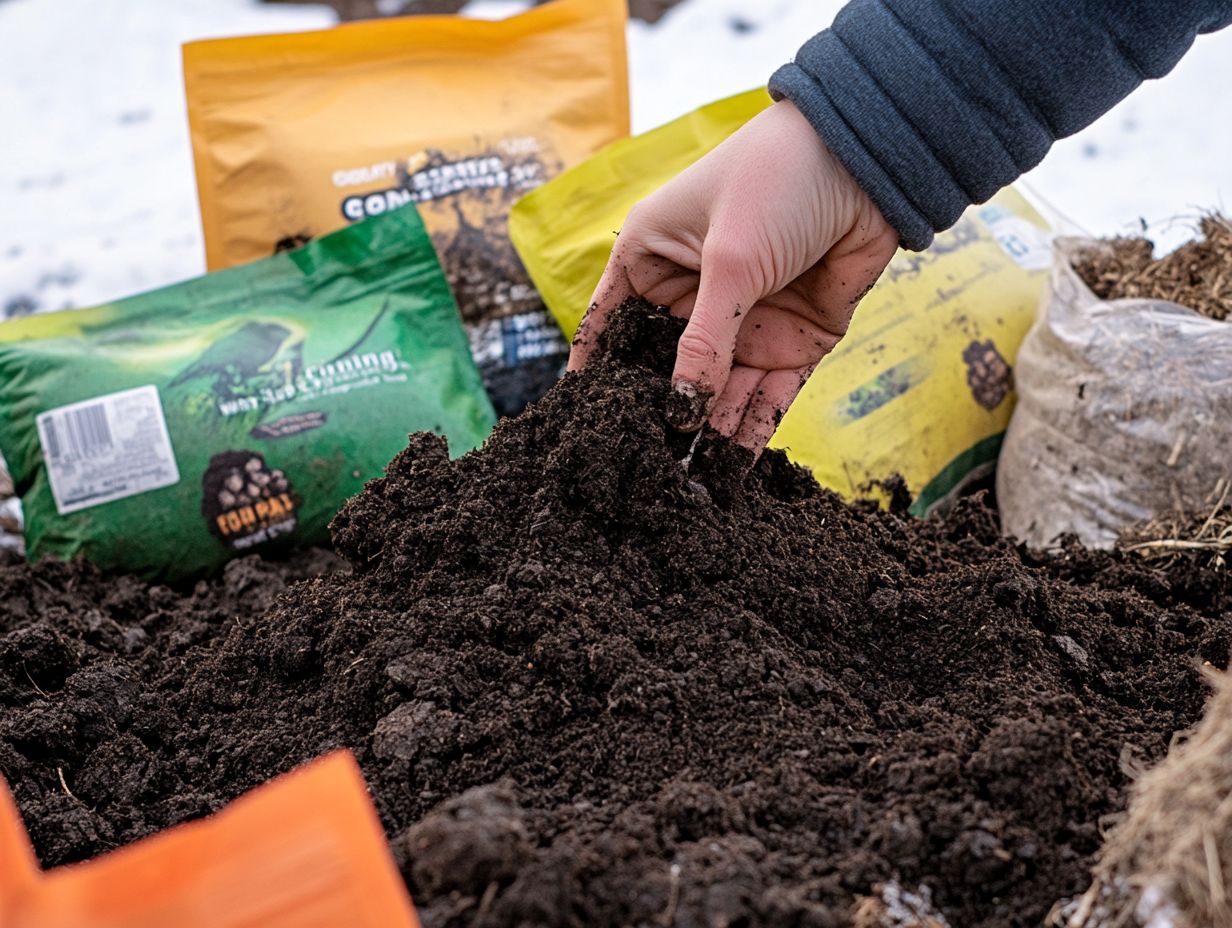
What are the top 5 essential soil amendments for cold climates?
The top 5 essential soil amendments effective for cold climates are compost, peat moss, manure, bone meal, and vermiculite.
Why is compost important for soil in cold climates?
Compost improves soil structure and boosts nutrient levels, which is essential for understanding soil needs for cold-climate plants. It also retains moisture in cold climates.
Can I use peat moss as a soil amendment in cold climates?
Absolutely! Peat moss is a fantastic soil amendment in cold climates. It retains moisture and helps regulate soil temperature, making it one of the best organic amendments for cold-weather soil.
What benefits does manure provide in cold climates?
Manure is rich in nutrients and enhances soil quality. It also helps the soil retain heat, which is crucial for plant growth.
Why is bone meal recommended for soil in cold climates?
Bone meal is ground-up animal bones that provide essential phosphorous for root development. In cold climates, it gives plants a nutrient boost when growth slows.
Is vermiculite useful for soil in cold climates?
Yes! Vermiculite is lightweight and absorbent, regulating soil moisture effectively. It also insulates plant roots from freezing temperatures.



